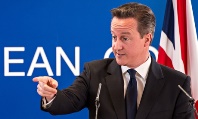What goes around comes around
Douglas Heath recalls an old 'Cold War' incident
Over the weekend the crisis in Ukraine deepened at least two notches as Russian-backed militia overran several Ukrainian military bases in the Crimea and General Philip Breedlove, supreme commander of NATO, warned that the Russian military forces now massed on the Ukrainian border could be preparing to ‘invade’ eastern Ukraine and/or threaten other sovereign territories such as Moldova.
Never mind the West’s hollow posturing and hand-wringing, in which the British foreign secretary William Hague and premier David Cameron have both played a prominent and ignominious part.
Hague seem to have become a robot, specialising in spouting grave-sounding but meaningless platitudes.
 Cameron’s press conference after an EU summit last week, in which he described the sudden Russian-backed Crimean referendum as ‘totally unacceptable’, was embarrassing cant of the highest order.
Cameron’s press conference after an EU summit last week, in which he described the sudden Russian-backed Crimean referendum as ‘totally unacceptable’, was embarrassing cant of the highest order.
His government has already emasculated the British military beyond a point where it can barely do more than ceremonial duties with any degree of efficiency and impact, so there’s nothing Britain can do in terms of intervention – even if the British people had the stomach for another foreign adventure, which (of course) they don’t.
Meanwhile, the West’s imposing of bank account and travel restrictions on a few dozen Russian and Ukrainian officials and politicians in retaliation for Russia’s annexation of the Crimea is pathetic and laughable.
The concerns of General Breedlove, NATO’s supreme commander, over the situation on Ukraine’s eastern border bring to my mind another occasion upon which Russian forces were massed upon an European sovereign border.
In late 1980, a geo-political crisis over Poland was in full swing. The Gdansk shipyard union Solidarity, led by Lech Walesa, was the first non-communist union in a Warsaw Pact country and became the focus for a political movement – encouraged by the West – that Russia perceived as a threat to its security. Over the course of several months, Russia and other Warsaw Pact countries had seriously beefed up the number of troops and military hardware within reach of Poland’s borders.
I had got married that autumn. It so happened that when I was at school, my best mate Mike and I had vowed to be each other’s Best Man when we got hitched. I had done the duty for Mike at his wedding to Chris a year and a half before but, sadly, when the time came for my big day, Mike – a rising army officer now stationed in Cyprus – was unable to attend.
As a result, to honour our commitment, we agreed that my new wife and I would instead spend a part of our honeymoon staying with Mike and Chris on his base in Cyprus. This we duly did.
 Mike, a gregarious character and consummate joke-teller, has always been prone to embellish his arguments and stories in order to emphasise a point and/or gain a laugh – even, if caught doing so, this was at his own expense.
Mike, a gregarious character and consummate joke-teller, has always been prone to embellish his arguments and stories in order to emphasise a point and/or gain a laugh – even, if caught doing so, this was at his own expense.
On our aforementioned honeymoon in Cyprus, at a dinner party with other officers and wives, Mike told my wife and I, as it were in strict confidence (because we were civilians), that – though the British public were unaware of it – NATO forces were currently at a high state of alert because of the crisis in Poland.
There were apparently five states of readiness, each given a different colour. If 1 was the lowest and 5 the greatest (effectively ‘war’), we were currently at the colour denoting 4.
The implications were serious and far-reaching. Assuming that the use of nuclear weapons was out of the question, the odds were heavily stacked against the West.
The Eastern block had over 1,200 tanks in the sector, compared to just under 300 available to NATO. The Eastern block number of ground troops on hand was equally superior to those that NATO could muster. In restrained tones, Mike set out, at some length, just how outnumbered, outgunned and comparatively under-resourced the NATO forces were.
Making conversation, in response I asked what exactly would happen, and in what order, if the NATO state of alert moved to ‘5’, i.e. armed conflict was at hand.
Mike was unequivocal: “Well, the first thing that would happen is that I resign my job. I didn’t join the Army to fight!”
Cue general hilarity around the dinner party table.

